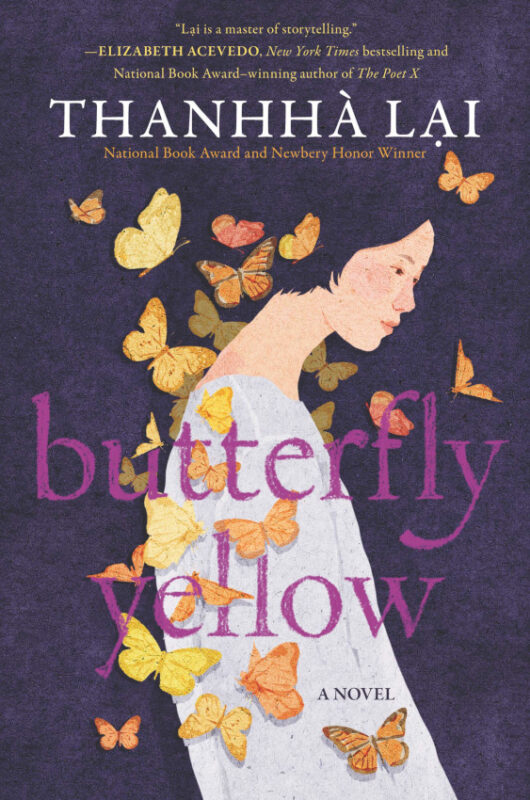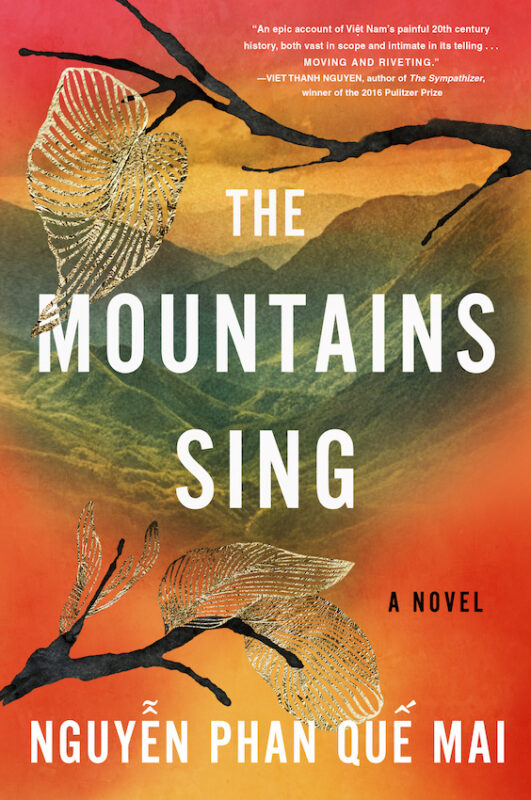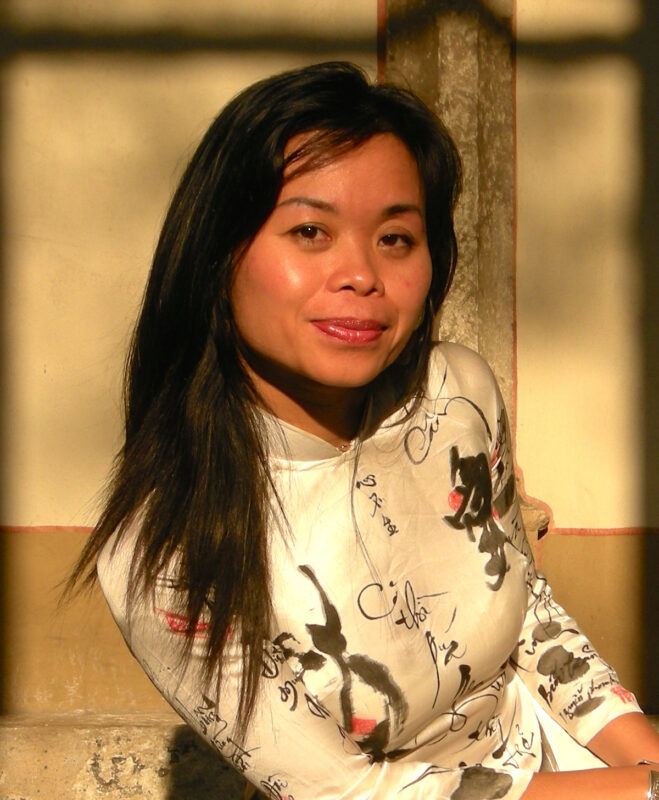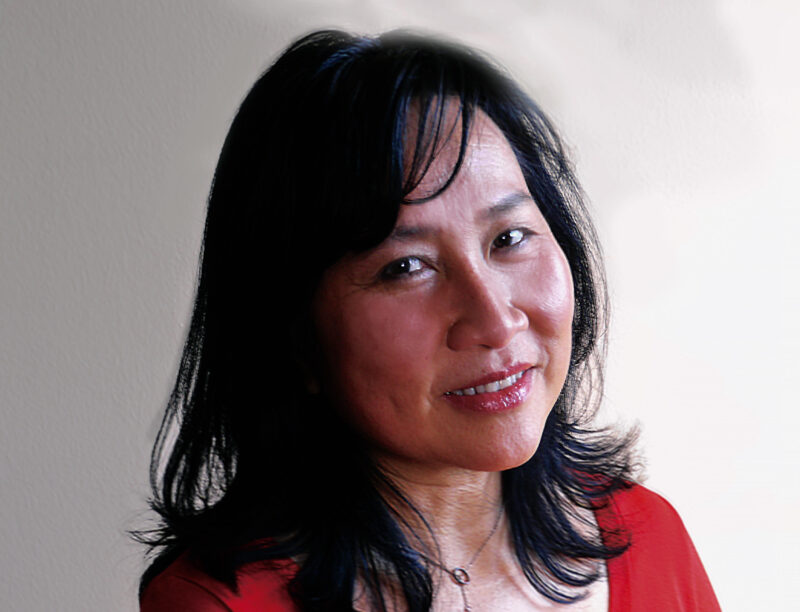 Nine years ago, when Nguyễn Phan Quế Mai won the Poetry of the Year 2010 from the Hà Nội Writers Association in Vietnam, Thanhhà Lại was about to receive the 2011 National Book Award for Young People’s Literature in the United States. Now, these two writers get together and discuss their latest works: Thanhhà Lại’s BUTTERFLY YELLOW (HarperCollins, September 2019) and Nguyễn Phan Quế Mai’s THE MOUNTAINS SING (Algonquin Books, March 2020).
Nine years ago, when Nguyễn Phan Quế Mai won the Poetry of the Year 2010 from the Hà Nội Writers Association in Vietnam, Thanhhà Lại was about to receive the 2011 National Book Award for Young People’s Literature in the United States. Now, these two writers get together and discuss their latest works: Thanhhà Lại’s BUTTERFLY YELLOW (HarperCollins, September 2019) and Nguyễn Phan Quế Mai’s THE MOUNTAINS SING (Algonquin Books, March 2020).
~
A conversation between Nguyễn Phan Quế Mai and Thanhhà Lại:
Nguyễn Phan Quế Mai (NPQM): I had to read Butterfly Yellow twice because I found it so real and moving. Your author’s note says that Hằng is inspired by a real-life character…
Thanhhà Lai (THL): Yes… I don’t know her name. I first saw her at a Buddhist temple. Her face was inside a tiny black-and-white portrait on a memorial wall honoring those who perished at sea. I thought of her intense stare while writing about Hằng, who also escaped on a tiny fishing boat and after horrific circumstances made it to Texas, only to face an entirely new set of obstacles. Likewise, your novel, The Mountains Sing, is filled with tragedies going back three generations.
NPQM: My friend’s grandmother once said, “The challenges faced by Vietnamese people throughout history are as tall as the tallest mountains”, and her words became those of Grandma Diệu Lan, one of the two narrators in The Mountains Sing. I was compelled to write this novel since the turbulent events of our history should not be forgotten.

THL: I know… so much war, horrors, sadness, injustice. The more tragic the story though, the more I try to balance it with humor.
NPQM: One of the phrases from Butterfly Yellow which is stuck in my mind is: “They could have fallen into a cactus pit and come out like porcupines.” How did you come up with such images and how do you manage to use humor in your work?
THL: Every time I think in Vietnamese, images pop into my head. To me, the language is poetry. Not always swooning verses though. I like to turn the phrases and add humor. I was born into sadness and yet all I remember is laughing with my family. My father has been missing in action since I was one. The family financial standing dwindled with each year of war. And yet my mother set the tone that we would NOT cling to each other and sob. We found all kinds of things to laugh about—mostly my brothers mimicked movie stars and singers and Clint Eastwood and Bruce Lee.
Coming out of that background, to me life is absurd despite my valiant efforts to make sense of it. So I survive by laughing.
NPQM: Survive by laughing. I love that mentality!
THL: The tears are built-in to our war stories. Humor provides a back door to sadness that allows for a more gentle, and perhaps deeper, absorption of the story. That doesn’t mean I in anyway try to lessen the horror in the story.
NPQM: We should not shy away from real-life horror nor alienate the reader from it. Through the horror that you painted in Butterfly Yellow, readers can understand more about the depth of Vietnamese history through what has happened to individuals.
THL: The Mountains Sing too is all about people living inside history, but it is unlike a typical academic history book. What impressed me were the relentless sensory details, such as eating banana stalks to stay alive and peeing into a handkerchief to sniff during a march through an agent orange soaked landscape. Were these details part of your family legend?
NPQM: My parents lived through the Great Hunger and told me incredible tales. Eating banana stalks was certainly something starving farmers of Việt Nam had to do. The story of soldiers putting pee-soaked handkerchiefs against their noses to protect themselves from agent orange comes from my parents’ neighbor who walked through Trường Sơn’s jungles during the war.
THL: You told me this novel took seven years and copious tears to write. Have you recovered?
NPQM: On the contrary, I feel like I fell into a cactus pit and came out a porcupine. Seriously, after finishing the book, my characters became a part of my life; they have changed me forever. How have Hằng and LeeRoy changed you? Did Hằng’s struggle with English come from your own experiences?
THL: I think of Hằng and LeeRoy as my children and am equally excited and anxious to release them into the world. And I did learn English the same way as Hằng – by breaking English syllables into pronounceable Vietnamese bits. No one understood me for a long time. Did you write to be understood? I heard that you started writing just around 10 years ago? What do you hope to achieve with The Mountains Sing?
NPQM: Writing helps me understand myself better. When I was growing up, I wanted to be a writer and my parents told me very clearly: no. They did not want their only daughter to be a writer, due to the long history of Vietnamese writers’ experiences. It was only when I was thirty-three years old that I returned to my writing dream, and I knew I wanted to write a book that placed the Vietnamese people at its center. In The Mountains Sing, the Trần family was divided into two: North and South. The wounds that divided this one family remain painful, just like the wounds that still divide our country and families, both at home and in the diaspora. With the novel, I hope that, we – Vietnamese people – wherever we are, will be open to difficult but necessary conversations that can help one another heal. And at the same time, I hope the story of Hương and Diệu Lan lets the international reader discover our common humanity, as in the words of Hương: “Somehow I was sure that if people were willing to read each other, and see the light of other cultures, there would be no war on earth.”
How about you, what made you write Butterfly Yellow?
THL: I’ve been thinking about a girl like Hằng for 30 years, ever since I was a reporter at the Orange County Register. But it felt exploitative to put a real face and name to such a dire, private story. I needed to use fiction. And I wanted to focus on her healing, not her tragedy.
NPQM: I was moved to witness Hằng’s healing process. Not just healing, but your depiction of Hằng’s trauma is skillful. I found out that by turning each page, I peeled away a layer of mystery of Hằng’s trauma: the way she dresses, the things that happened to her missing brother, to her parents and grandmother, and how she survived the boat trip across the turbulent ocean. Did you map out the features of her characteristics before you started writing?
THL: I always knew what happened to her in detail. I just didn’t know when to tell what. Once I decided to set the thrust of the story in her recovery phase (Texas) and not her traumatic phase (the boat), I knew she would be fighting her own memories. So then it was natural to sprinkle teasers of what really happened on the boat into the forward narrative of a ranch life in Texas alongside a cowboy-wannabe.
And in The Mountains Sing, your many stories are told in layers crossing decades and settings. I know you are equally fluent in Vietnamese and English. Tell us your path to becoming the first Vietnamese citizen whose writing in English is published by a major American publisher.

NPQM: I learned English in the 8th grade and I am still trying to improve it every day. I’ve published much more in Vietnamese and if I had a choice, I would write The Mountains Sing in my mother tongue. I must thank Viet Thanh Nguyen, without whom The Mountains Sing might still be sitting in my computer. I met him briefly at AWP in 2016, and we exchanged books. A few months later I gathered the courage and emailed him the synopsis of The Mountains Sing. He wrote back that “it sounded like a compelling book.” He forwarded the synopsis to Julie Stevenson at Massie & McQuilkin Literary Agency – one of the two agents who sold The Sympathizer. We signed an agency contract and not long afterwards, Betsy Gleick, the Editorial Director of Algonquin Books gave me a phone call. And the rest is history.
Through the publication process of this book, I got the help of so many wonderful people. I am especially moved by the support I’ve received from diasporic Vietnamese writers including Mai Elliott, Viet Thanh Nguyen, Ocean Vuong, Thi Bui, and yourself – who read the novel and gave it heart-felt blurbs.
How about you? How did you first get published?
THL: I wrote for almost two decades alone and aimless. A very long novel still sits in an old laptop and that’s where it shall stay. I made every pretentious mistake with that one, so for the next project I was released from writerly tendencies and just wrote about my first year as a refugee. That one became Inside Out & Back Again. The Mountains Sing is your first novel. I hope we see many more. I enjoyed the way you infused every page with all things Vietnamese, from plants to food to landscape to culture…
NPQM: I grew up in the countryside. My first trip out of Vietnam took place when I was twenty years old. Later when I returned, I lived in different parts of the country. It is therefore natural for the essentials of the Vietnamese lives to gather in the book. And you… even though you grew up in the States, you speak Vietnamese well. How did your Vietnamese language influence your writing in English?
THL: It depends on the character. If I have a character who’s thinking in Vietnamese, then I think in Vietnamese but English will pour from my fingertips. So I’m the writer and translator simultaneously. I find your use of idioms and adages in The Mountains Sing very authentic… It really helps to deepen the nature of a character’s Vietnamese-ness. How did you incorporate the many sayings into the text? My favorite adage is “Lửa thử vàng, gian nan thử sức” (Fire proves gold, adversity tests strength). Do you walk around life with these sayings in your head? I would love to do that.
NPQM: I love listening to elder Vietnamese people, who talk in idioms and proverbs, and many sayings stay with me. For example, when something nasty happens, my mind tells me “Trong cái rủi có cái may” (Good luck hides inside bad luck). When a person tries to cheat me, my mind will whisper “Trời có mắt” (Heaven has eyes.) In your book, Hằng’s grandmother has her own sayings too, such as “Tốt từ trong bụng tốt ra” (Kindness from the stomach out)…
THL: They’re all my mother’s sayings and I stole them… In your book, Grandma Diệu Lan makes a lasting impression on me. How did you conjure up such a vivid character?
NPQM: I have never met my grandmothers and I don’t even have a photo of them. Long before my birth, my father’s mother was killed in the Great Hunger and my mother’s mother died due to child birth. I grew up very jealous of my friends so I told myself that one day I would have a grandma, with my writing… You mentioned that your father has been missing in action, and I see a glimmer of his story in all your three books: Inside Out & Back Again, Listen, Slowly, and now Butterfly Yellow.
THL: It’s true, I specialize in missing fathers. You have one too in yours. Ah, the legacies of war. As for the mother character in your novel, her secret is revealed when Hương, her daughter, reads her journal. The mother’s shame and self-blame were heartbreaking. I kept wanting to scream, “It’s not your fault.”
NPQM: Fiction published inside Vietnam has plenty of heroic figures of soldiers who are fearless. Having interviewed many Vietnamese veterans, I know that post-war trauma is complicated and long-lasting. I want to show that trauma is gender-based: men and women experienced it very differently. Much fiction has been written about the trauma experienced by men in combat. We need more stories about the women who experienced the war and the trauma of family members.
THL: To me those are the real consequences of war. The little children. The men and the women who believed in a cause only to get flattened for their convictions. So many stories. We could write for the rest of our lives and it would be two tiny steps.
NPQM: I can’t agree more.
~ A passage from BUTTERFLY YELLOW (by Thanhhà Lại):
David repeats “bướm vàng” clear as day. His expression says it all: he’s as surprised as they are.
H gets in his face. “Du rì-mém-bờ?”
He shrugs.
“He remembers what?” LeeRoy asks.
“Áo-ờ xoong.” It’s good to see H flushed and delighted.
“Y’all have a song?”
H nods. “Bất-tờ-phờ-lai dé-lồ.”
“Butterfly yellow? You mean yellow butterfly.”
H starts to explain but pulls out her notebook. The most prepared notetaker on earth. Bưóm = butterfly, vàng = yellow.
She looks like she might hug her brother. ’Course she doesn’t. She does squeeze his arm, imprinting marks. David lets her hold on for a good while before shaking her off. She writes and sings some more.
Kìa con bướm vàng = look at butterfly yellow.
~ A passage from THE MOUNTAINS SING (by Nguyễn Phan Quế Mai):
That night, I crawled under our blanket, listening to Grandma’s prayers and her wooden bell’s rhythmic chime. She prayed for Buddha and Heaven to help end the war. She prayed for the safe return of my parents and uncles. I closed my eyes, joining Grandma in her prayer. Were my parents alive? Did they miss me as much as I missed them?
We wanted to stay home, but urgent announcements from public broadcasts ordered all citizens to evacuate Hà Nội. Grandma was to lead her students and their families to a remote place in the mountains where she’d continue her classes.
“Grandma, where’re we going?” I asked.
“To Hòa Bình Village. The bombs won’t be able to find us there, Guava.”
I wondered who’d chosen such a lovely name for a village. Hòa Bình were the words carried on the wings of doves painted on the classroom walls at my school. Hòa Bình bore the blue color in my dream – the color of my parents returning home. Hòa Bình meant something simple, intangible, yet most valuable to us: “Peace.”
AUTHOR BIOS:
 Born into the Việt Nam War in 1973, Nguyễn Phan Quế Mai grew up witnessing the war’s devastation and its aftermath. She worked as a street vendor and rice farmer before winning a scholarship to attend university in Australia. She is the author of eight books of poetry, fiction and non-fiction published in Vietnamese, and has been honored with many awards, including the Capital’s Literature & Arts Award, First Prize – the Poetry Competition About 1,000 Years Hà Nội. The Mountains Sing is Quế Mai’s first novel in English. Due for release on March 17, it has been selected as a Best Book of the Month/Season by The New York Times, The Washington Post, Real Simple, Amazon, PopSugar, Book Riot, Paperback Paris, She Reads… Currently based in Indonesia, Quế Mai’s journalism regularly appears in major Vietnamese newspapers. For more information, visit http://www.nguyenphanquemai.com
Born into the Việt Nam War in 1973, Nguyễn Phan Quế Mai grew up witnessing the war’s devastation and its aftermath. She worked as a street vendor and rice farmer before winning a scholarship to attend university in Australia. She is the author of eight books of poetry, fiction and non-fiction published in Vietnamese, and has been honored with many awards, including the Capital’s Literature & Arts Award, First Prize – the Poetry Competition About 1,000 Years Hà Nội. The Mountains Sing is Quế Mai’s first novel in English. Due for release on March 17, it has been selected as a Best Book of the Month/Season by The New York Times, The Washington Post, Real Simple, Amazon, PopSugar, Book Riot, Paperback Paris, She Reads… Currently based in Indonesia, Quế Mai’s journalism regularly appears in major Vietnamese newspapers. For more information, visit http://www.nguyenphanquemai.com
–
 Thanhhà Lại is the #1 New York Times bestselling author of Inside Out & Back Again, which won both a National Book Award and a Newbery Honor. This semi-autobiographical, debut novel in verse is part of the eighth-grade curriculum in New York and is taught throughout the world. Her second novel, Listen, Slowly, was named to numerous best book of the year lists. Her recent novel Butterfly Yellow, a YA debut, reviewed in the New York Times as “a radiant pearl of a book”, won the 2020 Scott O’Dell Historical Fiction Award and is a finalist for a Los Angeles Times Book Prize to be announced in April. Before turning to fiction, Thanhhà was a reporter at The Orange County Register in Southern California. She was born in Việt Nam and now lives in New York with her family. To learn more about Thanhhà and her charity, Việt Kids Inc., visit www.thanhhalai.com
Thanhhà Lại is the #1 New York Times bestselling author of Inside Out & Back Again, which won both a National Book Award and a Newbery Honor. This semi-autobiographical, debut novel in verse is part of the eighth-grade curriculum in New York and is taught throughout the world. Her second novel, Listen, Slowly, was named to numerous best book of the year lists. Her recent novel Butterfly Yellow, a YA debut, reviewed in the New York Times as “a radiant pearl of a book”, won the 2020 Scott O’Dell Historical Fiction Award and is a finalist for a Los Angeles Times Book Prize to be announced in April. Before turning to fiction, Thanhhà was a reporter at The Orange County Register in Southern California. She was born in Việt Nam and now lives in New York with her family. To learn more about Thanhhà and her charity, Việt Kids Inc., visit www.thanhhalai.com


